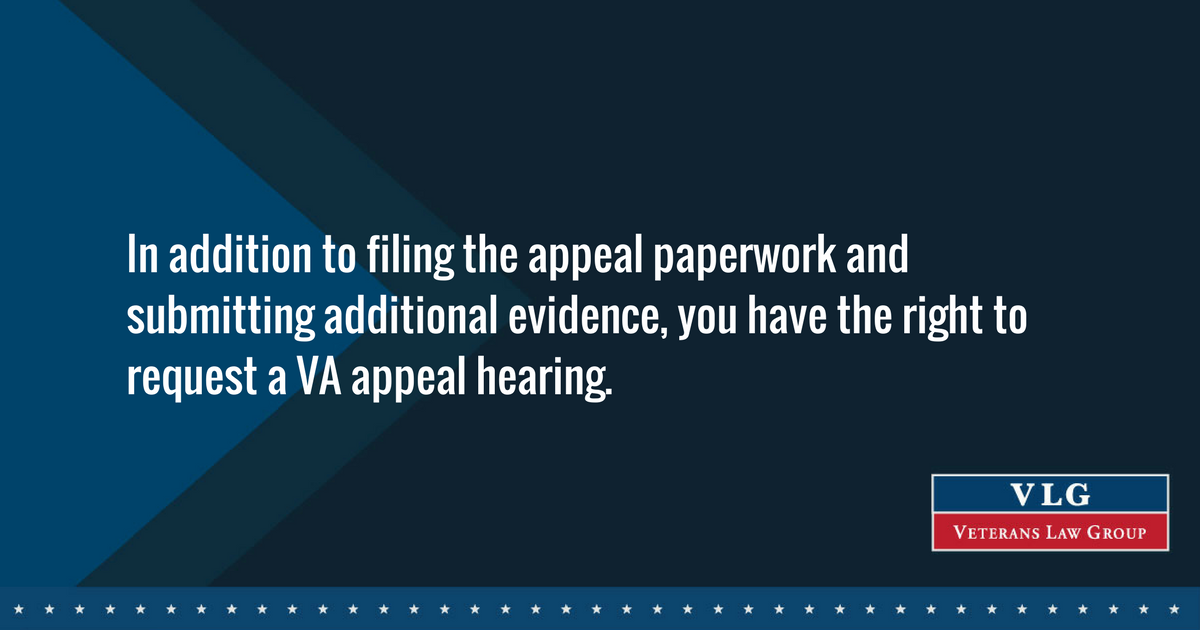Requesting a VA Appeal Hearing (DRO & BVA)
You selflessly completed your military service, but you have been left with a life-altering injury or condition. You disagree with the VA’s decision on your case and you have decided to appeal the decision and continue fighting for the benefits that you deserve. In addition to filing the appeal paperwork and submitting additional evidence, you have the right to request a VA appeal hearing.

DRO vs. BVA Appeal: What is the Difference?
The VA gives you the option of choosing a de novo review with a Decision Review Officer (DRO) appeal or a Traditional Review with the Board of Veterans Appeals (BVA). Both options give you the opportunity to request a hearing.
If you choose the DRO appeal, DRO will perform another review of your application and supporting evidence and make a new determination without giving any deference to the original decision. You do have the right to request a hearing with the DRO. This hearing will generally take place at your local regional VA office.
Once the DRO makes their decision, the VA will send you a rating decision, if they grant an increase or service connection and/or a Statement of the Case on those issues which they deny service connection or a rating increase. If you disagree with the rating decision, you can file an appeal and go before a different DRO. To file this appeal, you must complete a Notice of Disagreement within one year of the date on the rating decision. If you disagree with any portion of the Statement of the Case, you have the option of filing a substantive appeal with the BVA. To file this appeal, you must complete VA Form 9 within 60 days of the date of the Statement of the Case. You have the right to request a formal hearing before the BVA. You may request a hearing with the BVA via videoconference, travel board (when a judge from the BVA comes to your regional office, or in Washington (you travel to Washington D.C. for the hearing).
Should I Request a VA Appeal Hearing?
Most cases benefit from an appeal hearing because it gives you the opportunity to speak with the person who is making the decision on your case. This can be helpful for many reasons.
- Human Element: The VA deals with many cases each day, countless applications for benefits, and thousands of pages of medical records. A face-to-face conversation allows the decision maker to see you as a human and gives you the opportunity to describe your impairments in detail and explain how these impairments affect your daily life. It is much easier for a decision maker to understand the extent of your impairments and limitations when they can see and speak with you, instead of just reviewing a pile of paperwork and medical records.
- Opportunity to Answer Specific Questions: You’ll have the opportunity to answer the reviewer’s questions about gaps in the evidence or your medical record in real time. Many veterans are injured while serving, but they may not seek substantial medical treatment because they have other priorities or lack medical insurance. After 5 or 10 years, the injury gets progressively worse and now requires extensive medical treatment. If the decision maker were to rely only on the medical records, it is likely that your claim would be denied because it would be difficult to show service-connection. However, during the hearing, you have the opportunity to explain why you did not seek extensive medical treatment during your service. This information is invaluable to your claim and can often mean the difference between approval and denial.
- Additional Supporting Testimony: At a hearing, you can bring in testimony from a spouse or family member, which can be helpful to your claim. Many times, it is difficult to remember all of the details of your service, injuries, and treatment for your injuries, especially in a slightly stressful situation like a hearing. A family member that witnessed your obstacles and treatment can provide details that you may overlook or not feel are important. It is helpful to discuss this testimony with your family member before the hearing to refresh your memory and to make sure that your information is consistent with your family member’s recollection of events.
The appeal process can be overwhelming. If you are undecided about requesting a hearing or would like assistance in preparing your appeal or getting ready for a VA appeal hearing, your representative (veteran service officer (VSO) or attorney) is an excellent resource.
In particular, your representative can help outline the critical issues and legal principles of your case during the hearing to ensure that the decision maker has all of the necessary information to make a decision about your claim. Additionally, your representative can help you determine if a hearing is appropriate for your case.
The VA disability benefits claim process can be lengthy and frustrating, but finding answers to your disability claims questions doesn’t have to be difficult. Take our free quiz to determine what resources are available for your specific needs.
Additional Resources:
BVA Handout: Your Rights to Appeal Our Decision


